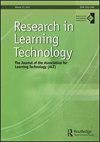Long-term effectiveness of immersive VR simulations in undergraduate science learning: lessons from a media-comparison study
IF 1.2
Q2 EDUCATION & EDUCATIONAL RESEARCH
引用次数: 17
Abstract
Our main goal was to investigate if and how using multiple immersive virtual reality (iVR) simulations and their video playback, in a science course, affects student learning over time. We conducted a longitudinal study, in ecological settings, at an undergraduate field-course on three topics in environmental biology. Twenty-eight undergraduates were randomly assigned to either an iVR-interaction group or a video-viewing group. During the field-course, the iVR group interacted with a head-mounted device-based iVR simulation related to each topic (i.e. total three interventions), while the video group watched a pre-recorded video of the respective simulation on a laptop. Cognitive and affective data were collected through the following checkpoints: a pre-test before the first intervention, one topic-specific post-test immediately after each intervention, a final post-test towards the end of the course, and a longitudinal post-test deployed approximately 2 months after the course. Through a descriptive analysis, it was found that student performance on the knowledge tests increased considerably over time for the iVR group but remained unchanged for the video group. While no within- or between-group differences were noted for intrinsic motivation and self-efficacy measures, students in the iVR group enjoyed all the simulations, and perceived themselves to benefit from those simulations.沉浸式VR模拟在本科科学学习中的长期有效性:来自媒体比较研究的经验教训
我们的主要目标是调查在科学课程中使用多个沉浸式虚拟现实(iVR)模拟及其视频播放是否以及如何影响学生的学习。在生态环境下,我们对一门本科生实地课程进行了一项纵向研究,涉及环境生物学的三个主题。28名大学生被随机分配到ivr互动组和视频观看组。在实地课程中,iVR组与每个主题相关的基于头戴式设备的iVR模拟进行交互(即总共三个干预),而视频组则在笔记本电脑上观看预先录制的各自模拟视频。认知和情感数据通过以下检查点收集:第一次干预前的预测试,每次干预后立即进行一次特定主题的后测试,课程结束时的最终后测试,以及课程后约2个月的纵向后测试。通过描述性分析,我们发现,随着时间的推移,iVR组学生在知识测试中的表现显著提高,而视频组则保持不变。虽然在内在动机和自我效能测量方面没有发现组内或组间差异,但iVR组的学生喜欢所有的模拟,并认为自己从这些模拟中受益。
本文章由计算机程序翻译,如有差异,请以英文原文为准。
求助全文
约1分钟内获得全文
求助全文
来源期刊

Research in Learning Technology
EDUCATION & EDUCATIONAL RESEARCH-
CiteScore
6.50
自引率
0.00%
发文量
13
审稿时长
20 weeks
 求助内容:
求助内容: 应助结果提醒方式:
应助结果提醒方式:


